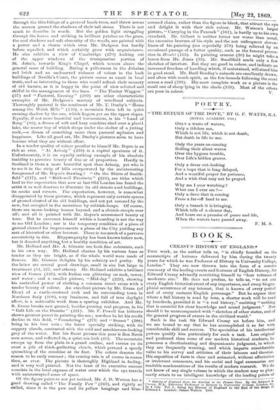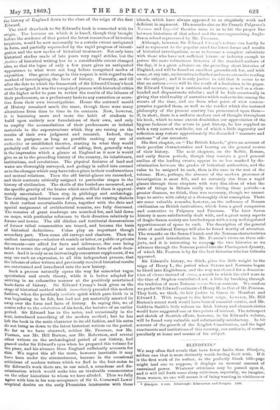BOOKS.
CREASY'S HISTORY OF ENGLAND.* Tins work, as the author tells us, "is chiefly founded on the manuscripts of lectures delivered by him during the twenty years for which he was Professor of History in University College,
London." They are now thrown into the form of a concise summary of the leading events and features of English History, Sir Edward Creasy advisedly restricting himself to "four volumes of moderate size." He does not profess, he tells us, "to set out every English historical event of any importance, and every biographical occurrence of any interest, that is known of every period and of every eminent English personage." But he argues that where a full history is read by tens, a shorter work will be read by hundreds, provided it is " a real history," omitting " nothing that is essential for clear knowledge and sound judgment." Nor should it be unaccompanied with " sketches of other states, and of the general progress of events in the civilized world."
Such is the task Sir Edward Creasy set before him, and we are bound to say that he has accomplished it so far with considerable skill and success. The specialties of his intellectual powers qualify him particularly for such a task. Less original and profound than some of our modern historical students, he possesses a discriminating and dispassionate judgment, in which they are frequently wanting, and which imparts considerable value to his survey and criticism of their labours and theories. His exposition of facts is clear and animated, without affectation or irrelevant comments, and his social and legal summaries are readable condensations of the results of modern research. We do not know of any single volume in which the student may so pleasantly attain to an intelligent knowledge of the leading pointed the history of England down to the close of the reign of the first Edward.
The chief drawback to Sir Edward's book is connected with its origin. The lectures on which it is based, though they brought before the students of that period the latest researches of historical inquirers, would be now necessarily to a certain extent antiquated in form, and partially superseded by the rapid progress of investigation and the new modes of historical treatment. Not only have historical studies made of late years very rapid strides, but the fashion of historical writing has to a considerable extent changed also, so that the lapse of only a few years gives an antiquated appearance to what were not long before recognized modes of exposition. One great change in this respect is with regard to the method of investigating the facts of history. Formerly, and till after the date to which the framework of Sir Edward Creasy's book must be assigned, it was the recognized process with historical critics of the higher order to pass in review the results of the labours of their predecessors, as a preliminary basis to any correction or accretion from their own investigations. Hence the outward mould of History remained much the same, though there were many alterations from time to time in its contents. Now, however, it is becoming more and more the habit of students to build upon entirely new foundations of their own, and only to employ the accumulations of their predecessors as isolated materials in the superstructure which they are raising on the results of their own judgment and research. Indeed, they seem to postpone as long as possible making any use of authorities or established theories, starting in what they would probably call the natural method of asking, first, generally what is the impression which a glance at England as it now is would give us as to the preceding history of the country, its inhabitants, institutions, and revolutions. The physical features of land and water are thoroughly surveyed, and geology is called into counsel as to the changes which may have taken place in their conformations and mutual relations. Then the old burial-places are ransacked, and their contents critically assigned to particular stages in the history of civilization. The skulls of the buried are measured, and the specific gravity of the brains which once filled them is approximately ascertained. Then step in philology and archaeology. The existing and former names of places, and the existing dialects in their earliest ascertainable forms, together with the date and special assignment of architectural remains, are fully discussed. The remains of great roadways are searched for, and laid down on maps, with particular reference to their direction relatively to forests and towns. The old ditches and territorial demarcations of former tribal communities are traced, and become the basis of historical deductions. Coins play an important though secondary part. Then come old surveys and charters. Then the earliest narratives—whether eh ronicle or letter, or public or private documents—are sifted for facts and inferences, due care being taken to secure the original or most authentic form of each document. And it is only as an increasingly concurrent supplement, if we may use such an expression, to all this independent process, that the labours of other writers and previously-received historical results are entertained and introduced into the new history.
Such a process naturally opens the way for somewhat vague speculation and crude theory, while it is better adapted for arriving in an exhaustive manner at the positively ascertained basis-facts of history. Sir Edward Creasy's book gives us the stage of historical method which immediately preceded this modern fashion, when the peculiarly realistic spirit which gave birth to it was beginning to be felt, but had not yet materially asserted its sway over the form and facts of history. In saying this, we of course refer to the substratum of his book, the lectures of an earlier Period. Sir Edward has in the notes, and occasionally in the text, introduced something of the modern method; but he has left the book in the main character in its old fashion, and his notes do not bring us down to the latest historical writers on the period. So far as we have observed, neither Mr. Freeman, nor Mr.
Pearson, nor Mr. Hill Burton, nor Mr. Robertson, and several other writers on the archaeological period of our history, bad passed under Sir Edward's eyes when he prepared this volume for the press, and his absence from England sufficiently accounts for this. We regret this all the more, however inevitable it may have been under the circumstances, because in the occasional criticisms of modern writers which we find in the foot-notes to Sir Edward's work there are, to our mind, a soundness and discrimination which would make him an invaluable commentator on the other historians to whom we have alluded. Thus we fully agree with him in his non-acceptance of Sir G. Cornewall Lewis' sceptical doubts on the early Phoenician intercourse with these
islands, which have always appeared to us singularly weak and deficient in argument. His remarks also on Sir Francis Palgrave's Norman and Imperial theories seem to us to hit the proper line between historians of that school and the uncompromising AngloSaxon school represented by Mr. Freeman.
Although, however, Sir Edward Creasy's volume can hardly be said to represent to the popular mind the latest forms and results of historical investigations, so as to become a complete substitute with those who have not sufficient leisure or industry enough to peruse the more voluminous histories of the standard authors of the day, it is a great advance on the preceding short histories of England, and will be found an excellent groundwork for, and with some, at any rate, an incentive to further and more extensive reading on the subject ; and it is only justice to add that it seems to us
that no serious errors will be the result of a limitation to its pages. Sir Edward Creasy is a cautious and accurate, as well as a clear
headed and dispassionate scholar ; and if he fails occasionally in giving that vivid reality of narrative which makes us live among the events of the time, and see from what point of view contem poraries regarded them, as well as the verdict which the matured philosophy of the present century has pronounced upon them— if, in short, there is a uniform modern cast of thought throughout his book, which to some extent diminishes our appreciation of the bygone fashions of the actors in past history, he has supplied us with a very correct wardrobe, out of which a little ingenuity and reflection may restore approximately the discarded " manners and customs" of our ancestors.
His first chapter, on " The British Islands," gives an account of their peculiar characteristics and bearing on the general course
of their history. The next chapters, on the (Celtic, Roman, and early Saxon periods, though they contain a good general outline of the leading events, appear to us less marked by dis crimination between the grades of historical authorities, and the
value to be assigned to each, than is the case in the rest of the volume. Here, perhaps, the absence of the modern processes of
investigation is most felt, and we certainly rise from a rapid glance through these chapters with very dim ideas of what the state of things in Britain really was during these periods—a greater dimness, we think, than was necessary, though we cannot hope to arrive with safety at a thoroughly clear conception. There are some valuable remarks, however, ou the influence of Roman civilization ou British institutions, which form a good companion and corrective to Palgrave and Freeman. The later Saxon history is more satisfactorily dealt with, and a great many aspects of Anglo-Saxon society are touched upon with a very well regulated apportionment of space to each. The description of the general state of medireval Europe will also be found worthy of attention.
The remarks on the Saxon Church and the Norman characteristics form a good introduction to Mr. Pearson's views on these subjects, and it is interesting to comps, the two histories as we advance through the Norman period into the Plantagenet dynasty, of which Mr. Pearson is by far the best historian who has hitherto appeared.
Sir Edward's history, we think, gives too little weight to the reign of Henry I., the period whcu Saxons and Normans began
to blend into Englishmen, and the way was cleared for a demarcation of classes instead of races, a result to which the civil wars in the time of Stephen contributed net a little by breaking through the tradition of mere Norman versus Saxon contests. We confess we prefer Sir Edward's estimate of Henry 11. to that of Mr. Pearson.
They both, we think, do fair justice to Simon de Montfort and
Edward I. With respect to the latter reign, however, Mr. hill Burton's recent work would have been of essential service, and Mr.
Goldwin Smith's little volume on Irish history and characteristics would have suggested one or two points of interest. The retrospect and sketch of Scottish affairs, however, in Sir Edward's volume, will be found very valuable and substantially satisfactory. In his account of the growth of the English Constitution, and the legal enactments and institutions of this country, our author is, of course, peculiarly at home and master of his subject.































 Previous page
Previous page